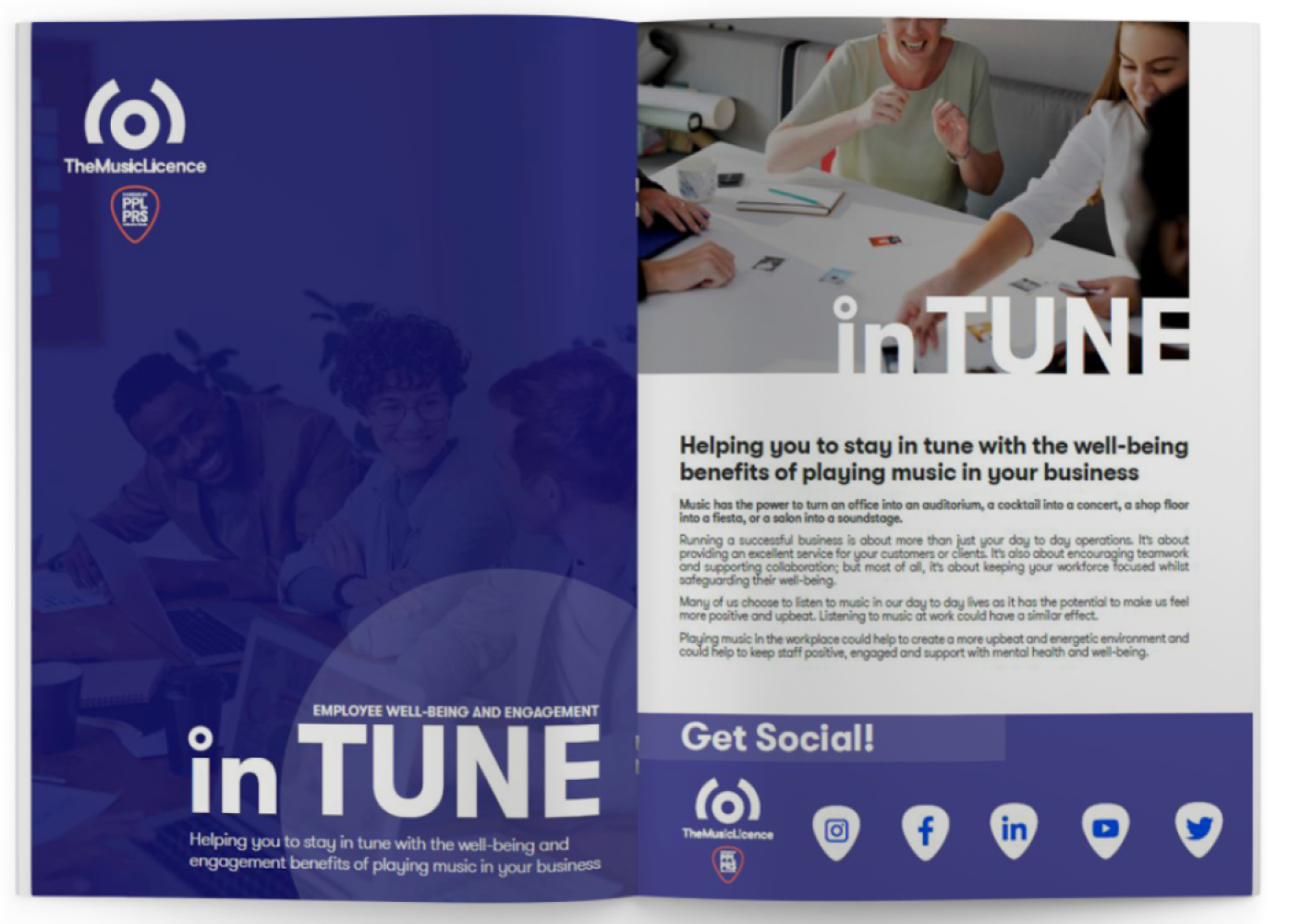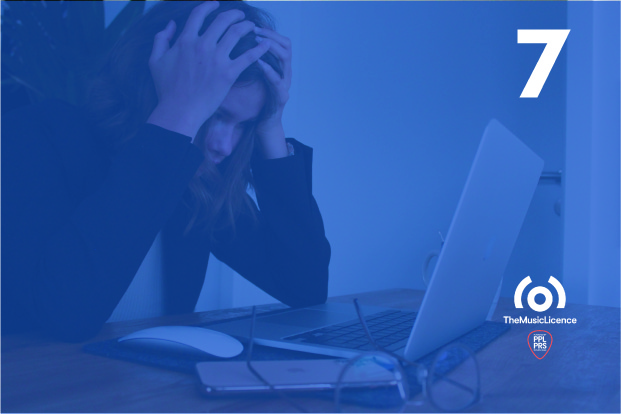
A THIRD of working Brits have already experienced burnout just ONE MONTH into 2025, finds PPL PRS survey
Work-related burnout is at ‘crisis point’ as three-quarters (75%) have experienced it in the past twelve months alone, our new survey has found.
It’s more important than ever to create a positive working environment. Once the holiday season is over, spirits can be a little low and with Seasonal Affective Disorder affecting 2 million people in the UK, it’s time to change your tune!

Playing music can be an important part in helping to create an environment that both your customers and staff enjoy.
It could help to reinvigorate the atmosphere, improve the health & wellbeing of employees and aid in collaboration & morale.

Helping you to stay in tune with the well-being & engagement benefits of playing music in your business.
Download your copy of inTune today!
Our music choices can affect our mood.
Happy, upbeat music causes our brains to produce chemicals like dopamine and serotonin, which evokes feelings of joy, whereas calming music relaxes the mind and body.


Music affects both our autonomic nervous system which manages our heartbeat, and our limbic system which regulates our emotions.
Listening to music before a source of stress accelerates recovering time compared to when music hasn’t been listened to.
Music can affect our brains in a number of ways but classes like music therapy have become a popular form of treating anxiety & depression.


Get in the zone with specific genres!
Listening to genres like classical music whilst you’re carrying out immersive work can get your creative juices flowing, with no lyrics to tear you away from the depths of concentration.
Those shivers down our spine that we feel when listening to music, well, that’s a result of a dopamine hit, both from when we hear the music we like and at the point we anticipate it coming.

*94% of people struggling with anxiety said music helped lift their mood.
*62% said music made them feel better about themselves/more confident this rose, to 72% with 16-24 & 25-34 year olds.
*78% said they felt more motivated after listening to music this rose to 81% among women.
*https://www.bpi.co.uk/news-analysis/music-helped-the-uk-get-through-lockdown-new-insights-show/

Listening to music has the potential to relax our minds as well as our bodies.
Did you know?
Research has shown that even heavy metal music can help lower your blood pressure.
Music could benefit both the health and well-being of your workforce. By creating a more upbeat environment, it could also make your employees feel valued and improve their overall attitude and performance.
32% of office-based Brits surveyed feel that music is an important aspect in creating a positive work environment.


Music genres with a slightly higher BPM (beats per minute) than your heart rate will encourage your heart to keep pace, pumping more oxygen around your body and have you firing on all cylinders.
We all know exercise can improve your wellbeing but can you imagine working out without music?
According to the BPI, 75% of those undertaking gym/fitness activities did so with music as an accompaniment.*
*https://www.bpi.co.uk/news-analysis/music-helped-the-uk-get-through-lockdown-new-insights-show/


According to the British Association for Music Therapy, music can really help those with psychological, cognitive or communicative needs.
Music therapy relies on a sensory stimulation to provoke a positive response to certain situations.
No matter what your business you want it to run smoothly, be this assigning workloads, managing partnerships or setting out your budget.
But running a successful business is about more than just your day to day operations. It’s about providing an excellent service for your customers or clients. It’s also about encouraging teamwork and supporting collaboration; but most of all, it’s about keeping your workforce focused whilst safeguarding their well-being.
Many of us choose to listen to music in our day to day lives as it has the potential to make us feel more positive and upbeat. Listening to music at work could have a similar effect.
Playing music in the workplace could help to create a more upbeat and energetic environment and could help to keep staff positive, engaged and support with mental health and well-being.

Work-related burnout is at ‘crisis point’ as three-quarters (75%) have experienced it in the past twelve months alone, our new survey has found.

Workout Music 2025: Create the best playlist for Spinning, Pilates, Yoga, Zumba and more | Guide to best exercise class music, with BPM and tempo for fitness.

Brits have given up on their New Year’s resolutions and are already looking to cancel their gym memberships less than a quarter into the year – according to our recent survey.

As we approach International Women’s Day 2025, we were keen to see if anything had changed for women in the workplace over the last 3 years.

How Can Music Affect Your Mood & Reduce Stress? Benefits of music Did you know that listening to

You might find also yourself feeling inspired and considering if this is the time to renew that gym membership or buy those new running shoes.
Understandably though, it can be difficult sometimes to find the time and motivation to embark on your fitness journey. But music can help!
**An office with 4 or fewer workers could play music for £104.82 providing the music is not audible to customers or other visitors to the premises.
(8am – 6pm, Monday to Friday)
Alternatively you can complete the online form and an adviser will call you back soon.
We use cookies on our website to give you the most relevant experience by remembering your preferences and repeat visits. Cookies are also used for ads personalisation.
By clicking “Accept All”, you consent to the use of ALL the cookies. However, you may visit "Cookie Settings" to provide a controlled consent.
| Cookie | Duration | Description |
|---|---|---|
| __cfruid | session | Cloudflare sets this cookie to identify trusted web traffic. |
| _GRECAPTCHA | 5 months 27 days | This cookie is set by the Google recaptcha service to identify bots to protect the website against malicious spam attacks. |
| AWSALBCORS | 7 days | This cookie is managed by Amazon Web Services and is used for load balancing. |
| cookielawinfo-checkbox-advertisement | 1 year | Set by the GDPR Cookie Consent plugin, this cookie is used to record the user consent for the cookies in the "Advertisement" category. |
| cookielawinfo-checkbox-analytics | 11 months | This cookie is set by GDPR Cookie Consent plugin. The cookie is used to store the user consent for the cookies in the category "Analytics". |
| cookielawinfo-checkbox-functional | 11 months | The cookie is set by GDPR cookie consent to record the user consent for the cookies in the category "Functional". |
| cookielawinfo-checkbox-necessary | 11 months | This cookie is set by GDPR Cookie Consent plugin. The cookies is used to store the user consent for the cookies in the category "Necessary". |
| cookielawinfo-checkbox-others | 11 months | This cookie is set by GDPR Cookie Consent plugin. The cookie is used to store the user consent for the cookies in the category "Other. |
| cookielawinfo-checkbox-performance | 11 months | This cookie is set by GDPR Cookie Consent plugin. The cookie is used to store the user consent for the cookies in the category "Performance". |
| CookieLawInfoConsent | 1 year | Records the default button state of the corresponding category & the status of CCPA. It works only in coordination with the primary cookie. |
| elementor | never | This cookie is used by the website's WordPress theme. It allows the website owner to implement or change the website's content in real-time. |
| viewed_cookie_policy | 11 months | The cookie is set by the GDPR Cookie Consent plugin and is used to store whether or not user has consented to the use of cookies. It does not store any personal data. |
| Cookie | Duration | Description |
|---|---|---|
| __cf_bm | 30 minutes | This cookie, set by Cloudflare, is used to support Cloudflare Bot Management. |
| bcookie | 2 years | LinkedIn sets this cookie from LinkedIn share buttons and ad tags to recognise browser ID. |
| lang | session | This cookie is used to store the language preferences of a user to serve up content in that stored language the next time user visit the website. |
| li_gc | 2 years | This cookie, set by LinkedIn, is used to store consent of guests regarding the use of cookies for non-essential purposes. |
| lidc | 1 day | LinkedIn sets the lidc cookie to facilitate data center selection. |
| lpv{accountid} | 30 minutes | This LPV cookie is set to keep Pardot from tracking multiple page views on a single asset over a 30-minute session. For example, if a visitor reloads a landing page several times over a 30-minute period, this cookie keeps each reload from being tracked as a page view. |
| visitor_id{accountid} | 10 years | This cookie is set for visitors by the Pardot tracking code. The visitor cookie includes a unique visitor ID and the unique visitor identifier for your account. For example, the cookie name visitor_id1245 stores the visitor ID 1010101010. The account identifier, 12345, makes sure that the visitor is tracked on the correct Pardot account. The visitor value is the visitor_id in your Pardot account. |
| visitor_id{accountid}-hash | 10 years | The visitor hash cookie contains the account ID and stores a unique hash. For example, the cookie name visitor_id12345-hash stores the hash “855c3697d9979e78ac404c4ba2c665533”, the account ID is 12345. This cookie is a security measure to make sure that a malicious user can’t fake a visitor from Pardot and access corresponding prospect information. |
| Cookie | Duration | Description |
|---|---|---|
| _ce.cch | session | This cookie, set by CrazyEgg, is used to check if cookies can be added. |
| _ce.s | 1 year | This cookie, set by CrazyEgg, is used to track a recording visitor session unique ID, tracking host and start time. |
| cebs | session | Crazy Egg - Used to track the current user session internally. |
| cebsp | session | Crazy - Egg - Used to determine if a survey should be shown. |
| Cookie | Duration | Description |
|---|---|---|
| __racnt | session | We use Ruler Analytics to measure our marketing activities. This includes tracking page visits and traffic sources we receive. Calls may also be recorded for monitoring and training purposes. For opt-out information please Contact info@ruleranalytics.com or visit https://www.ruleranalytics.com |
| __racplx0 | 30 days | We use Ruler Analytics to measure our marketing activities. This includes tracking page visits and traffic sources we receive. Calls may also be recorded for monitoring and training purposes. For opt-out information please Contact info@ruleranalytics.com or visit https://www.ruleranalytics.com |
| __rafm | session | We use Ruler Analytics to measure our marketing activities. This includes tracking page visits and traffic sources we receive. Calls may also be recorded for monitoring and training purposes. For opt-out information please Contact info@ruleranalytics.com or visit https://www.ruleranalytics.com |
| __rasel0 | 30 days | We use Ruler Analytics to measure our marketing activities. This includes tracking page visits and traffic sources we receive. Calls may also be recorded for monitoring and training purposes. For opt-out information please Contact info@ruleranalytics.com or visit https://www.ruleranalytics.com |
| __rasesh | 2 years 9 months 23 days | We use Ruler Analytics to measure our marketing activities. This includes tracking page visits and traffic sources we receive. Calls may also be recorded for monitoring and training purposes. For opt-out information please Contact info@ruleranalytics.com or visit https://www.ruleranalytics.com |
| __ratel0 | 30 days | We use Ruler Analytics to measure our marketing activities. This includes tracking page visits and traffic sources we receive. Calls may also be recorded for monitoring and training purposes. For opt-out information please Contact info@ruleranalytics.com or visit https://www.ruleranalytics.com |
| _ce.gtld | session | Used by Crazy Egg to identity the top level domain. |
| _ga | 2 years | The _ga cookie, installed by Google Analytics, calculates visitor, session and campaign data and also keeps track of site usage for the site's analytics report. The cookie stores information anonymously and assigns a randomly generated number to recognise unique visitors. |
| _ga_7YJ8ZZ6DPB | 2 years | This cookie is installed by Google Analytics. |
| _gat_UA-99249120-1 | 1 minute | A variation of the _gat cookie set by Google Analytics and Google Tag Manager to allow website owners to track visitor behaviour and measure site performance. The pattern element in the name contains the unique identity number of the account or website it relates to. |
| _gcl_au | 3 months | Provided by Google Tag Manager to experiment advertisement efficiency of websites using their services. |
| _gid | 1 day | Installed by Google Analytics, _gid cookie stores information on how visitors use a website, while also creating an analytics report of the website's performance. Some of the data that are collected include the number of visitors, their source, and the pages they visit anonymously. |
| AnalyticsSyncHistory | 1 month | Used to store information about the time a sync with the lms_analytics cookie took place for users in the Designated Countries. |
| CONSENT | 2 years | YouTube sets this cookie via embedded youtube-videos and registers anonymous statistical data. |
| pardot | past | The pardot cookie is set while the visitor is logged in as a Pardot user. The cookie indicates an active session and is not used for tracking. |
| UserMatchHistory | 1 month | Linkedin - Used to track visitors on multiple websites, in order to present relevant advertisement based on the visitor's preferences. Users can opt out of tracking activity directly on the LinkedIn website. |
| Cookie | Duration | Description |
|---|---|---|
| _fbp | 3 months | This cookie is set by Facebook to display advertisements when either on Facebook or on a digital platform powered by Facebook advertising, after visiting the website. Users can opt out of tracking activity directly on the Facebook website. |
| bscookie | 2 years | This cookie is a browser ID cookie set by Linked share Buttons and ad tags. |
| fr | 3 months | Facebook sets this cookie to show relevant advertisements to users by tracking user behaviour across the web, on sites that have Facebook pixel or Facebook social plugin. Users can opt out of tracking activity directly on the Facebook website. |
| IDE | 1 year 24 days | Google DoubleClick IDE cookies are used to store information about how the user uses the website to present them with relevant ads and according to the user profile. |
| test_cookie | 15 minutes | The test_cookie is set by doubleclick.net and is used to determine if the user's browser supports cookies. |
| VISITOR_INFO1_LIVE | 5 months 27 days | A cookie set by YouTube to measure bandwidth that determines whether the user gets the new or old player interface. |
| YSC | session | YSC cookie is set by Youtube and is used to track the views of embedded videos on Youtube pages. Users can opt out of tracking activity directly on the YouTube website. |
| yt-remote-connected-devices | never | YouTube sets this cookie to store the video preferences of the user using embedded YouTube video. Users can opt out of tracking activity directly on the YouTube website. |
| yt-remote-device-id | never | YouTube sets this cookie to store the video preferences of the user using embedded YouTube video. Users can opt out of tracking activity directly on the YouTube website. |
| yt.innertube::nextId | never | This cookie, set by YouTube, registers a unique ID to store data on what videos from YouTube the user has seen. Users can opt out of tracking activity directly on the YouTube website. |
| yt.innertube::requests | never | This cookie, set by YouTube, registers a unique ID to store data on what videos from YouTube the user has seen. Users can opt out of tracking activity directly on the YouTube website. |

